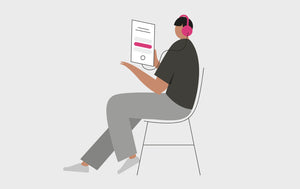What to Expect when Wearing a Hearing Aid for the First Time
Finding out that you need to wear hearing aids can be a daunting prospect. Not only is there the social stigma to overcome but it's easy to imagine hearing aids being similar to a pair of glasses, inconvenient at times, but restoring the impairment perfectly. Unfortunately this is not the case, even with top of the range hearing aids. But don't despair, some basic knowledge will equip you to get used to hearing aids quicker. Read on for more details.
What is a hearing aid?
A hearing aid is a small electronic device that helps people with hearing loss to hear more clearly. On a basic level, it does this by amplifying sound and making it louder. Hearing aids come in a variety of shapes and sizes, and there are many different types available on the market.
Hearing aids work by converting sound into electrical signals. These signals are processed and manipulated within a digital chip, and then sent to the receiver component which amplifies the sound and sends it to the eardrum. The eardrum vibrates and sends the sound on to the inner ear. From here, the sound is processed by the brain and turned into recognizable sounds.
By carefully selecting a hearing aid that's chosen based upon your lifestyle and needs as well as your specific hearing loss, you can regain a high level of hearing ability.

Will I receive any side effects from wearing hearing aids?
There are no known side effects of wearing hearing aids, but some people may experience discomfort or irritation from the devices if they are not fitted properly. If you experience any problems after wearing your hearing aids, please consult your hearing health care professional or audiologist. By following your audiologist's instructions and taking care of your hearing aids, you can enjoy all the benefits that they have to offer without any negative side effects.
Getting used to Hearing Aids
Hearing Loss is individual
Hearing loss is different for everyone, so try not to compare your ability to hear with others. This is your journey with a destination determined by your very unique lifestyle choices and expectations.
Adapting takes time
Take your time, there is no sudden fix, no instantaneous cure. You're not just relying on great amplification in order to access the hearing world. Your brain has become used to a different level of sound and will take time to adapt to the sounds that will suddenly bombard it from all directions. For example, the chopping sound of a knife on a wooden board can seem overwhelming at first. Retraining your brain to identify and separate sound can take weeks and months to perfect. Everyone is different, and adaptation depends upon your level of hearing loss, how suddenly this loss occurred and how quickly your brain adapts to the new sounds.
Be patient and work things through, it will all be worth it in the end. Loudness can be surprising. The startling thing about wearing a hearing device is that it intensifies all sound generated around you significantly. When trying a hearing aid for the first time, having suffered hearing loss, the sudden rush of sound from all angles can be overwhelming. Digital hearing aids should be pre-programmed to ensure the sound levels you receive are both safe and processed at an appropriate volume. Even so, you still have to get used to receiving or ignoring certain background noise, just as your brain would naturally do.
Get in touch with your audiologist
An audiologist is a hearing healthcare professional who specializes in diagnosing and treating hearing loss and other ear disorders. They may work in a variety of settings, including hospitals, clinics, schools, or private practice. To get the hearing aid to work correctly, it may need some additional tuning, tweaking and programming after a few weeks of use, so it is essential that you get in touch with your audiologist for a consultation.
The Right Fit is important
There's nothing like the right fit. Inserting your hearing aid correctly takes a bit of practice and is often tricky to do for the first time. Once the technique is mastered, you won't look back. If you continue to feel discomfort or the sound quality is compromised, it may be worth getting a healthcare professional to take a look at your ear canal and make sure it's not blocked with excess wax.
Hearing aids can make your ear feel itchy at first which can be helped by proper cleaning each night, for example using a spray for the ear such as the Earol Olive Oil Spray. At no point should you feel pain. If this occurs, you need to seek further advice. Wearing something in or behind your ear for protracted periods of time can be a weird sensation at first. Rest assured with time, you'd get used to wearing one, just as people adjust to wearing glasses.
Avoid noisy situations at first
Your body will need time to adjust to all the extra amplification. Day by day, you can increase your usage until it's at a level that you are comfortable with. It's best to use it in quieter places initially. Throwing yourself into a noisy party or clamorous restaurant on day one may only serve to give you a headache.
"Pardon, what did you say?"
Such sentences may be less frequent thanks to the use of a hearing aid. But you will still say it if you're in a noisy environment. Even with the best directional technology in your hearing aids, it may be difficult to hear as well as you used to.
Make sure to clean your hearing aid regularly
Your hearing aid is an essential piece of equipment that helps you hear better in all settings. Like any other piece of technology, it needs to be properly cared for in order to function at its best. Cleaning your hearing aid keeps it functioning properly. Just like any other piece of technology, your hearing aid needs to be regularly cleaned to keep it functioning properly. Dust, dirt, and other debris can accumulate on the internal parts of the device and cause it to function improperly. By cleaning your hearing aid regularly, you can help keep it in good working condition.
Rediscovering your voice
Discover a new you - or rather a new voice. That initial surprise when you speak for the first time with amplification is a common experience for many first time wearers. You'll get used to it.
Helping yourself to hear better
Give your hearing an added boost by being aware of your listening environment:
- Turn your back on interfering background noise where possible. In a restaurant for example, sitting with your back to the wall will help prevent the experience of being able to hear the conversation from the table behind better than the one in front of you.
- Try and concentrate on one conversation at a time.
- Position yourself closer to the person you are talking to so that you can see their facial expressions easily. This way, you can read their lips and use their body language to reinforce what you're hearing.
Remember a conversation doesn't have to be word perfect.
Removing it can be a strange experience
Taking off your hearing aid may cause sound to feel leaden. Don't worry, this is perfectly normal and just serves to prove that you've been hearing better with a little bit of help from your aid.
About Hearing Direct
We are one of the world's leading hearing aid specialists. HearingDirect offers a wide range of affordable products, and information resources to help improve the quality of life for the hard of hearing. We sell:
- Hearing aids,
- Batteries,
- Accessories such as earplugs,
- and amplified devices such as super loud alarm clocks and amplified phones.
Like and chat to us on our facebook page
.


